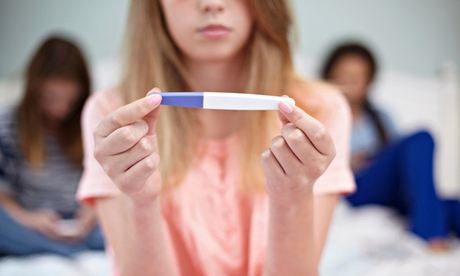
At the opening of Trouble by Non Pratt, Hannah describes her latest venture with boyfriend Fletch, fleshing-out the details for us of what happens beyond the bedsheets:
"We were dressed and downstairs with our History books open by the time his mum came in, although you could tell she didn't buy it the way she gave me evils when Fletch's little brother ran over to show me the crown he'd made at school. Whatever. She might think she knows me by looking at the length of my skirt, but it's her youngest son who's got me sussed. Kids see all the way to your soul. What you wear and how you look mean nothing to them."
This passage illustrates a lot of the issues which are so pertinent to discussions of teenage pregnancy today: how manifest sexuality in girls is still frowned upon, and how many make personality assumptions based on the wearing of a mini-skirt, to highlight just two. Hannah's fairly liberal attitude to sex in Trouble, for example, really defines how many of her friends in school respond to her pregnancy. How fair is that? And how much do you think attitudes to teenage pregnancy have changed over the years?
When reading this book, I also wondered to what extent the central theme of teen pregnancy still relates to cultural consciousness today? When the teenage pregnancy rate is actually at its lowest since 1969, what compels us to continue writing and thinking about it? And, more broadly, how useful is it as a topic as a way of raising questions about other issues teens are facing: abortion, adoption, growing up, becoming a parent, confronting your future, relationships?
Do we need yet more teen pregnancy books when texts out there such as After by Amy Efaw, Boys Don't Cry by Malorie Blackman and Bumped by Megan McCafferty do it so well already? Do we need a book specifically on the issue of teen pregnancy at all when other novels interweave it with broader storylines - after all, Bella's teen pregnancy in Breaking Dawn wasn't the pivotal focus for Meyer's Twilight series, but it was there all the same. And when classic works of literature such as Nathaniel Hawthorne's The Scarlett Letter have already tackled this topic, what more could possibly be said of it? What do you think Trouble says that is unique?
And how much is Trouble a 'modern' look at the issue? In her podcast with site member Merle, Non Pratt discussed how the temporality of 'issues' in society makes them dangerous to write about if they are rooted to a specific time period - you run the risk of being out of date by the time the book is actually published! But the language is gritty, the style spare - it feels like a very twenty-first century book. How is Trouble's 'modernity' a useful addition to the conversation?
Email us your thoughts at childrens.books@theguardian.com, join in via our Facebook page or @Guardianteenbks and we will add your thoughts below! We can't wait to hear what you think!

